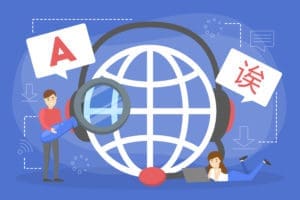There are many options for automated translation software to make translation work fast and cheap. This article focuses on Google Translate simply because it is one of the most widely available and free to use. Other software systems are likely to have the same or similar challenges.
Google Translate supports 103 languages and is a decade into continual development. Five hundred million people use Google Translate, with the overwhelming majority of users (92%) being outside of the United States. Since Google’s mission is “to organize the world’s information and make it universally accessible and useful,” it stands to reason their database of material would be the best warehouse of words to use for translation purposes. Google Translate compares texts in multiple languages and converts them using a translate/back translate process to refine interpretations in the drive for accuracy. During the translate/back translate processes, Google identifies patterns to help it widen its translation capability.
Despite this enormous amount of data and technical processes, complex legal terms can confuse the software, resulting in mistakes and inaccuracies.
What is back translating?

This translate/back-translation process is similar to what you likely did in your high school foreign language class. For example, you took an English sentence and translated it into French. Next, your teacher, who speaks French fluently, read what you wrote and then explained to you in English what it meant. It may have gone something like this:
English: “I have no time.”
Translated into French: “Je n’ai pas le temps.”
Translated back into English: “I do not have time.”
You can use this same process to check for accuracy on automated translation software.
How do contronyms complicate matters?
What trips up automated translation software is when a text contains contronyms. Contronyms are words that have contradictory meanings based on the context of the sentence. An easy example is “dust.” Depending on the context, “dust” could mean to wipe away the dust or to apply a light coating of a dust-like substance.
Here’s how Google Translate handles a sentence using dust as an application:
English: “She dusted the countertop with sugar before rolling the donuts.”
Russian: “Она посыпала столешницу сахаром, прежде чем скатывать пончики.”
Back translation: “She sprinkled sugar on the counter before rolling the donuts.”
The software can understand the word “donuts” and “sugar” and then determines in what meaning the word “dusted” is based on the context. The translation is pretty accurate. Overall, Google Translate performs reasonably well with the most commonly used terms for translation into widely spoken languages because it has a sizeable document library for comparisons.
Here’s an example of how Google Translate doesn’t work as well. That same language is translated into Nyanja, spoken in some African countries, including Malawi, Zambia, Mozambique, and Zimbabwe.
English: She dusted the countertop with sugar before rolling the donuts.
Nyanja: “Anapukuta patebulo ndi shuga asanayambe kupukuta donuts.”
Back translation: “She wiped the table with sugar before wiping the donuts.”
Google Translate doesn’t find a match in Nyanja for “donuts,” so it becomes confused with how to translate the word “dusted.” Here it provides “wiped” and subsequently uses that same verb in the action with the unknown word “donuts.”
Are Your Contract Negotiations Finished?
“Finish” is another contronym. How you use the word as an adjective can mean successfully completed or completely destroyed.
“Our talks were quite successful, and our contract negotiations are finished.”
“Mr. Smith was appalled by what we offered and left the room. Our contract negotiations are finished.”
As you can see from these examples, your status can be very different depending on the type of “finished” is used.
When you need your legal translation to be 100% accurate, contact The Perfect Translation.
We don’t use automated translation software that often results in mistakes and inaccuracies. Instead, our team comprises humans with fluency in the original and target languages and having experience in the type of translation you need: business contracts, real estate agreements, finance and banking, immigration, and more. The Perfect Translation will ensure your essential work is accurately translated the first time. Contact us today for a free quote.

Leave a Reply